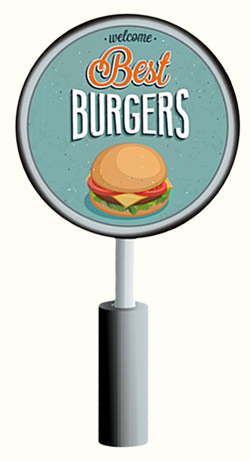When you have a new website created for your business, the first thing you want to do is find it on the internet. Small business owners often go straight to Google Search looking for it. But having a website that is brand new (recently launched / made to go “live”) on the internet is not the same thing as being able to find it in a search engine such as Google.
When a website is “live,” you will be able to find it by putting in the website URL such as “http://www.bestburgersandfries.com” into a web browser’s address (location) bar, but you can’t put in the name of your business, such as “Best Burgers and Fries,” into a search engine or address bar and expect to find it the same day it is launched.
The address bar is located at the top of all web browsers.
When you type in a Google Search box, you are searching the Google index, not the whole Internet.

In order to find your brand new website in a Google Search, Google must first discover your website on the internet and this takes time. It typically takes 2-3 weeks for Google to add new websites to their search results, but the time can vary.
How do Search Engines find new websites?
Search engines send a bot or spider (web crawler) around the internet to collect information. Crawling is the process where the bot goes from website to website finding new information for a search engine. The spider must be able to crawl and read the information on your site. Learn more about how search engine spiders and bots work.
Once your website is crawled, it has to be indexed. Indexing is the processing of the information gathered by the bot. Once web pages are processed, they are added to a search engine’s index if they are determined to be good quality content.
If you’ve been waiting several weeks and still can’t find your website anywhere in a Google search, you can check to see if your site has been indexed. In Google, type Site:www.yourwebsitename.com and hit the search button. (Put your actual website domain name in here instead of the example used.) If nothing shows up, it means your website has not been not indexed yet.
Once indexed, your initial search results may be disappointing.
Google and other search engines treat brand new websites like brand new businesses. They monitor them to determine their value. Unfortunately, it takes time to build your website’s credibility. Search engines work hard to provide their visitors with the best matched websites for their search “query.”
What is a search query? A search query = the actual word or string of words that a search engine visitor types into a search box to find what they are looking for.
Search engines want to provide good results for their visitors… not for you.
2 Simple Ways to Put your Best Foot Forward
Search engines want to make sure that new websites are providing quality content and are practicing proper SEO (search engine optimization) methods. See 8 Steps to Search Engine Optimization.
- If your site is brand new, you want to develop incoming links to your website over time in a fairly consistent manner. Never resort to schemes to get incoming links to your site.
- If you are not ranking well for specific search words or phrases that seem obvious to you, take a look at the web pages in your site. If the search term (keyword phrase) isn’t in the actual content of your site, it’s not considered relevant to the search engines. Make sure those keywords or phrases are actual text in your web pages. If you have the Best Burgers in town, are the words “Best Burgers” in your website? What town is your burger restaurant in? Is your location mentioned in your website too? You may want to take a look.
Why are you ranking below your competitors?
 Even if you are providing quality content and honest SEO methods, you will likely still rank below your competitors initially.
Even if you are providing quality content and honest SEO methods, you will likely still rank below your competitors initially.
• Your competitors’ websites may have been on the internet longer and gained Google’s trust. A website is considered “new” when it has been on the internet for less than 6 months. After 6 months, you will likely see improved rankings.
• Your competitors’ websites probably have more inbound links than your brand new website.
• Your competitors may be actively maintaining their websites, providing fresh content each time the search engine spiders stop by to visit.
Keep in mind, ranking on Google is a process. SEO is a long-term strategy.
2 Things you can do to help your website get indexed
- Since web crawlers, like the Googlebot, discover your site through links, one way to gain incoming links is by creating social networking pages and adding links to your new website from those social media pages. Consider joining Twitter, Facebook, Google+, LinkedIn, and Pinterest. See Understanding Social Media.
- Also remember that blog content is generally crawled and indexed much faster than regular pages on a static website, so consider having a blog that supports your website.
Conclusion
Remember that when you type in a Google Search box, you are actually searching the Google index, not the whole Internet. So be sure to give Google and the other search engines time to discover your site. In the meantime, include the complete URL of your website in the address bar of a web browser to find it.



Return to Top